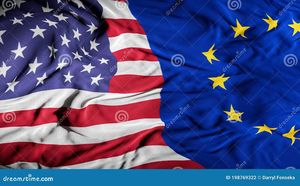LONDON—Political and social tensions continue to grip the United Kingdom, igniting fierce debates around issues of race, police accountability, and free speech. Recent events have underscored the fraught atmosphere, with public outcry stemming from various incidents, including the tragic stabbing of three young girls and subsequent riots across England.
On July 29, 2024, Merseyside police found themselves at the epicenter of controversy after the brutal killing of Alice Dasilva Aguiar, 9, Elsie Dot Stancombe, 7, and Bebe King, 6. The alleged assailant, 18-year-old Axel Muganwa Rudakubana, now faces multiple charges, including three counts of murder, ten counts of attempted murder, and possession of illegal substances.
Compounding the tragedy, Rudakubana has also been charged under the UK’s Terrorism Act, as police discovered evidence of ricin—a deadly toxin—and al-Qaeda training materials at his residence. Despite the clear indications of terror-related elements, authorities have been criticized for their reluctance to label the attack explicitly as terrorism, raising questions about transparency and accountability.
Critics, including Toby Young of the Free Speech Union, have suggested the police and government have shown hypocrisy, particularly around the information released concerning the suspect. Young criticized the authorities for maintaining silence about the attacker’s motives, adding, “I think the rationale was... they didn’t want to prejudice the trial.” He alluded to what many see as a disparity, pointing out how the response might differ if the alleged attacker were someone labeled as “a far-right white supremacist.”
This sorrowful event triggered protests and riots across multiple cities, stemming from the public’s frustration and assumption of the attacker’s background. These riots saw individuals facing severe penalties for online comments deemed incendiary, reflecting the government's hardening stance on free speech. For example, Lucy Connolly, the wife of a Conservative Party politician, was jailed for over 31 months for inflammatory posts against asylum seekers, and social media influencer Wayne O’Rourke received three years for what authorities classified as inciting unrest.
Prime Minister Keir Starmer found himself embroiled in the debate, swiftly condemning the rioters as “far right,” before any formal convictions were made. Critics argue this shows another inconsistency; as Winston Marshall pointed out, Starmer condemned the rioters without hesitation, which many felt was prematurely labeling individuals who were still awaiting trial.
Public figures across the political spectrum, including right-wing leaders like Nigel Farage, have also spoken out, questioning the lack of transparency from the government and police following the attack. Farage expressed suspicion about whether “the truth is being withheld from us,” calling for answers about whether Rudakubana was previously known to security services.
The incident challenging the UK’s social fabric also extends to the media sphere, with BBC presenter Mishal Husain sharing her struggles with racism this past year. Reflecting on the environment post-summer riots, Husain noted, “I think I have felt racism...in a way I probably haven’t...before and...that’s been hard.” Her poignant comments highlight concerns about the state of racial tolerance within the UK today.
During her acceptance speech for the Charles Wheeler Award, which honors achievements in broadcast journalism, Husain described her previous belief in the UK as “probably the only country...where it’s possible to achieve [success] with such...a very obviously Muslim name.” This belief, she admitted, has recently wavered, signaling broader societal issues about race and inclusivity.
Events across the UK, from the summer riots to police operations, seem to reflect growing unrest and tension along racial and political lines. A warning was sounded by former counter-terrorism police officer Neil Basu, who criticized figures like Farage for allegedly undermining law enforcement efforts and fanning the flames of discontent through unsubstantiated claims.
With rising racial hate crimes and political divisions appearing more pronounced than ever—exemplified by the convicts of recent riots and public protests—the UK stands at a turning point. From accusations of double standards among lawmakers to the dissection of free speech policies, the intersection of race and politics continues to cast shadows over public discourse.
Adding to the concern, the UN has warned of rising hate speech within the nation, calling for action against the growing tide of racism among politicians and public figures. Recent statements reflect this atmosphere of urgency, prompting discussions on how best to encourage unity rather than division.
The UK, with its multicultural identity, is now grappling with the consequences and realities of its past and present. With political leaders and citizens divided, the path forward may depend on fostering genuine dialogue and confronting deep-seated issues of race and identity to restore trust among the community.
On one hand, the poignant narrative surrounding the tragic stabbings emphasizes the urgency for transparency from law enforcement. On the other, the voices of those like Husain add depth to the complex reality faced by many individuals of color and underrepresented communities. The transformative change the UK so desperately seeks may lie not only within policy reforms but also within its societal willingness to embrace and celebrate diversity.
Political capital and public sentiment will undoubtedly play roles as the nation navigates this volatile terrain. Whether by holding accountable those who incite division or amplifying the voices of those who highlight unity, the outcome of these heated conversations remains to be seen. Will the UK address its challenges head on, or will voices for change be drowned out by discord? The choice now rests with both its politicians and its people.



